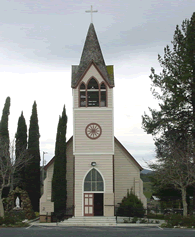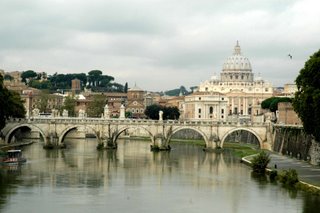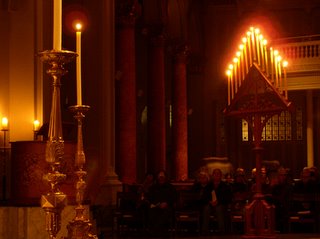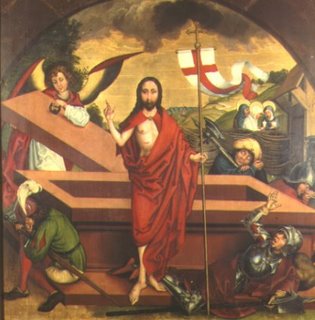 Part II - A Country Chapel and a Good Night's Sleep
Part II - A Country Chapel and a Good Night's Sleep
Good Friday. Immaculate Conception Church. Tres Pinos
Good Friday was not going as I expected. For being one of the most solemn days of the years, it was quickly degenerating into a typical busy work day. I took a jog in the morning at the insistence of a friend who wanted a work-out partner. Then, I was consumed with errands for the rest of the morning.
So when I arrived around noon at this small country chapel five miles outside of Hollister , I was not at my most recollected. I was thinking on the fact that I had to work the afternoon shift, and dealing mentally with other matters of my change-of-life transition. When I arrived at this chapel, the first thing I noticed was that the statues had not been covered. Immaculate Conception Church was built in the 19th century probably by Irish immigrants, and unlike other churches, it was not gutted in the spirit of Vatican II. Normally, then, these statues would be a consolation to see. They were, however, a disturbing presence on this most grave of days.
The service started on time, but throughout the hour and a quarter I was there, I could not help but pass the time vacillating between the part of a bored teenager dragged there by their parents and a stuck-up theatre critic.
"No, not this part again."
"You know, there was a genuflection at this part in the old rite."
"Is it over yet?"
"They are reading the Passion as if this were a really bad third grade play...."
The only thing close to a prayer was my occasional glances to the stained glass window next to me portraying the agony in the Garden. For me, though, I think I was just admiring the artwork.
The veneration of the Cross finally took place. An organ played softly in the background, but in my head, an imaginary choir was singing the
Crux Fidelis, one of my favorite Gregorian hymns:
Crux fidelis, inter omnes arbor una nobilis:nulla silva talem profert,fronde, flore, germine.Dulce lignum,Dulces clavos, dulce pondus sustinet.
But that's all it was. That's all that was left for me: an imaginary Church. Sure, I had first heard this hymn in seminary, and it was still being sung there on this day. Still, it is no longer the reality of the Roman Catholic Church. And it would never be again
I venerated the Cross in the traditional manner, and quietly left the chapel since I had to go to work.
On my way, I reflected on who I had become. An Orthodox priest friend had summed it up best: I am a dinosaur who knows too much. For those people in that chapel, what they were doing was perfectly alright, and I cannot judge them for it. They had been radically severed from the Traditions of the Church, and there was no way of going back to them. Indeed, they probably had no idea that they even exist. For me, however, I cannot ignore them. I have experienced them very deeply, and they have formed me in a way in which it is no longer possible to go back to the Church of my childhood.
What is it that I am then? Someone who wants to face the Lord during worship, not Fr. Bill. Someone who does not mind not understanding everything that is said or sung during worship, since I know that its meaning is more profound than human speech. Someone who instead of criticizing the past as something outdated, wants to listen to it and give it the benefit of the doubt. Someone who knows that God resides in silence, recollection, and beauty, and not in noise, enthusiasm and banality.
Does this make me a snob? Am I missing the Gospel in order to defend a theory that would reduce the Church to a mere museum piece? Or is the Gospel not something detached from ecclesiastical Tradition, but rather the latter serves as a prerequisite to understand the former, and this fact has been forgotten by modern man? Tradition, beauty, order, and mystery are the foundation and ground of the Christian message, not a perk of particular historical circumstances. There is thus no excuse not to invite modern man to come up higher, to worship in a way that makes him feel uncomfortable at first. That is, in the end, what the Cross is.
At first, I thought that I would go to the Holy Saturday Vigil tomorrow to see if my impressions of the last two days had been mistaken. Then again, I would be working a swing shift, so maybe I would not go after all. In any event, I don't think my impression would change.
Holy Saturday. My room. Hollister.It is Holy Saturday, and the sun has just went down. I will not stay up, I will not try to wait for the sun in the darkness. It is no longer necessary.
For six years, this night has been one of anticipation. In the fabricated Roman rite dating back to 1954, a Vigil was supposed to be celebrated around midnight, and of course, in the Byzantine Church, Divine Liturgy begins at midnight traditionally. Even as a teenager, I remember staying up all night on this day. I always wanted to be a light in the darkness, a vigilant watcher standing by in order to greet Christ, the Sun of justice. A romantic vision, but an unnecessary one. The sun will come up anyway. I do not need to be there to watch.
Yes, there was indeed joy in those vigils. There was, however, also fear. Fear of losing God, fear of doing the wrong thing. Fear that my life and my works were not good enough. Fear that I would not make it to who I needed to be. Fear of the judgment to come.
We can put so must trust in ourselves. It is very easy for some to think that Christ always offers us and "either/or" ultimatum in our life. For some unfortunate people, happiness may be a sign of eternal reprobation. I speak here mostly of myself, and unfortunately, some people in my life have taken advantage of this fear to make me live in inhuman ways, maybe even without them knowing it.
The worst part about this is that part of you wants it that way. It is easier to not change and suffer than it is to take a chance and be happy. "I must do this," is always our cry, whether this means becoming a missionary in another country, withdrawing to the desert to pray, or anything else. The problem is this can be a great way to try to escape from yourself, and ultimately from God. It does all catch up to you eventually. This I know all too well.
It is very hard for me to accept that God wants me to love Him and that's it. It has not been easy for me to put away the feeling that whether or not the sun comes up tomorrow depends on what I do as a cleric, a monk, etc. It has not been easy to come to terms with the fact that Faith has been given to me as a gift, not in exchange for putting on a habit, and at the cost of my misery and suffering. Blessed are those who have no clue what I am talking about!
All this being said, it might not be easy for me to lay down my head and sleep tonight. Maybe there will be voices of doubt in my head accusing me of disobedience to my superiors in leaving my monastery and kicking my vocation into the gutter. Maybe it will say, "Whatever happened to 'what does it profit a man if he gains the whole world but loses his soul'?" Maybe it will tell me that I will never be happy, that earthly happiness is fleeting and I made a mistake in giving up the better half.
Maybe this will happen. I think, however, that I will turn out the light, lay my head on my pillow, pull the covers over me, and just dose off, content and thankful....
After all, it's not my victory over sin and death that was won on this night. It's Christ's victory. All I have to do is accept it the best I can.











